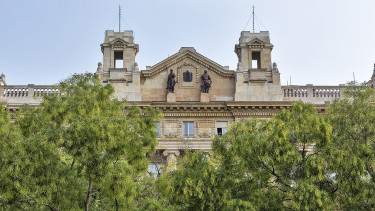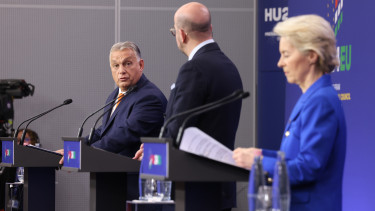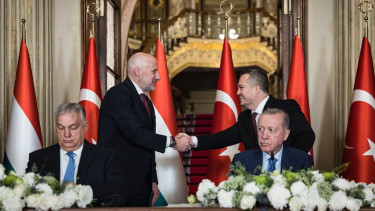Economy
Major decisions are in the making in Brussels - Commissioner
This Friday, heads of State and Government will meet in Brussels to discuss a matter that will impact the life of all European citizens and their common future: the next long-term EU budget.
It won't be about pushing figures around on paper, but about drawing the outline of a budget the size of our ambitions and imagination as a Union, so we can efficiently tackle the most pressing challenges at our door and in the horizon - managing migration in the long run, fighting climate change and holding our own in a globalised economy, to name a few.
To steer the discussion, the Commission set out options - and their consequences - that are illustrations of ideas that have long been in the public debate. Two or three detailed scenarios for each big EU item of expenditure, designed to really make you think about how much EU you want in your life. This is so leaders and citizens alike can make informed and swift choices.
Time indeed matters here; the Commission will table its proposal on 2 May so the budget can be adopted before the 2019 European elections. Because each week spent dithering over budget headings has repercussions on the ground. In my area of competence, Cohesion policy, a late adoption of the budget could mean that 100,000 EU-funded projects might not start on time. We are talking about small businesses awaiting their needed EU financial boost, delayed delivery of EU-funded medical equipment or children spending a few more months in a school badly in need of renovation works.
There are some aspects of the architecture of the next budget that won't require lengthy discussions; there is broad consensus already that the next EU budget will have to be simpler, more flexible, better performing.
In Cohesion policy it means fewer, simpler, clearer rules for the authorities dealing with the funds and for businesses applying for funding. It means that, within a 7-years budget framework, more flexibility is needed to face unforeseeable events. And it also means that not only should EU funding focus on areas with clear EU added value - the Commission is currently working on such a definition - it should further support reforms where needed, precisely so that the results of EU and national public investments are more quickly and strongly felt by citizens.
Cohesion policy, which I'm proud to be responsible for, has proven its EU added value. As the biggest investment tool, it has been a lifeline for many EU countries, regions, cities, academia, businesses throughout the economic crisis, creating 1.2 million jobs in the last 10 years. It brings about more growth in all Member States by opening new markets, increasing trade and improving infrastructure. And it has helped heal the scars of European History, with decades of cross-border cooperation programmes.
But there is more than economic power to cohesion policy; as many disenchanted voters express their frustration by supporting anti-European parties, Cohesion policy shows Europe's concrete achievements on the ground, whilst working hand-in-hand with ministers, regional authorities, mayors and local stakeholders. Its political added value is matched by none. It ensures that every region, town and village - which means every single citizen - can benefit from the European project.
But it is now time to hear from Member States on the future of Cohesion policy and the EU budget as a whole. The Commission will put forward a proposal, but the European Parliament and the Member States - that is, ultimately, the citizens - will make the calls. So I invite citizens to join the discussion and answer the EU-wide public consultation the Commission launched on 10 January. The EU's benefits are so huge that it is hard to put a price tag on them, but this is precisely what we will have to do.
The article was written by EU Commissioner for Regional policy Corina Crețu
Front page photo by Emmanuel Dunand AFP
It won't be about pushing figures around on paper, but about drawing the outline of a budget the size of our ambitions and imagination as a Union, so we can efficiently tackle the most pressing challenges at our door and in the horizon - managing migration in the long run, fighting climate change and holding our own in a globalised economy, to name a few.
To steer the discussion, the Commission set out options - and their consequences - that are illustrations of ideas that have long been in the public debate. Two or three detailed scenarios for each big EU item of expenditure, designed to really make you think about how much EU you want in your life. This is so leaders and citizens alike can make informed and swift choices.
Time indeed matters here; the Commission will table its proposal on 2 May so the budget can be adopted before the 2019 European elections. Because each week spent dithering over budget headings has repercussions on the ground. In my area of competence, Cohesion policy, a late adoption of the budget could mean that 100,000 EU-funded projects might not start on time. We are talking about small businesses awaiting their needed EU financial boost, delayed delivery of EU-funded medical equipment or children spending a few more months in a school badly in need of renovation works.
There are some aspects of the architecture of the next budget that won't require lengthy discussions; there is broad consensus already that the next EU budget will have to be simpler, more flexible, better performing.
In Cohesion policy it means fewer, simpler, clearer rules for the authorities dealing with the funds and for businesses applying for funding. It means that, within a 7-years budget framework, more flexibility is needed to face unforeseeable events. And it also means that not only should EU funding focus on areas with clear EU added value - the Commission is currently working on such a definition - it should further support reforms where needed, precisely so that the results of EU and national public investments are more quickly and strongly felt by citizens.
Cohesion policy, which I'm proud to be responsible for, has proven its EU added value. As the biggest investment tool, it has been a lifeline for many EU countries, regions, cities, academia, businesses throughout the economic crisis, creating 1.2 million jobs in the last 10 years. It brings about more growth in all Member States by opening new markets, increasing trade and improving infrastructure. And it has helped heal the scars of European History, with decades of cross-border cooperation programmes.
But there is more than economic power to cohesion policy; as many disenchanted voters express their frustration by supporting anti-European parties, Cohesion policy shows Europe's concrete achievements on the ground, whilst working hand-in-hand with ministers, regional authorities, mayors and local stakeholders. Its political added value is matched by none. It ensures that every region, town and village - which means every single citizen - can benefit from the European project.
But it is now time to hear from Member States on the future of Cohesion policy and the EU budget as a whole. The Commission will put forward a proposal, but the European Parliament and the Member States - that is, ultimately, the citizens - will make the calls. So I invite citizens to join the discussion and answer the EU-wide public consultation the Commission launched on 10 January. The EU's benefits are so huge that it is hard to put a price tag on them, but this is precisely what we will have to do.
The article was written by EU Commissioner for Regional policy Corina Crețu
Front page photo by Emmanuel Dunand AFP









